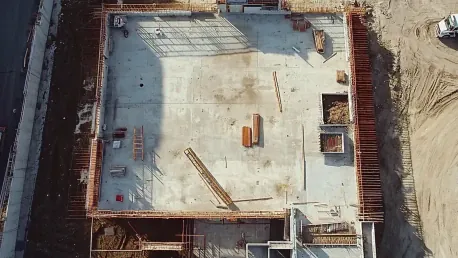The European construction industry, traditionally marked by slow innovation uptake and fragmentation, is undergoing a significant transformation. This shift is propelled by a burgeoning class of technology startups that are securing critical funding to catalyze industry-wide changes. As of October 16, 2024, a total of €390 million has been invested in 62 construction tech funding rounds, with most funds flowing into early-stage startups. This article delves into the fundraising efforts, technological innovations, and future aspirations of six prominent construction tech startups.
Overview of the Construction Technology Sector
Slow Pace of Innovation and Industry Fragmentation
The European construction sector is traditionally known for its conservative approach toward new technologies. Despite the significant potential for efficiency gains, the industry’s operational profitability averages around 5%, leaving little margin for error when experimenting with unproven innovations. This cautious stance has resulted in a fragmented landscape where each project stage operates in silos, often leading to inefficiencies and redundancies.
A closer look at the construction process reveals a series of bottlenecks that hinder the seamless integration of new technologies. Whether it’s project planning, material procurement, or on-site execution, each phase is riddled with its unique set of challenges. The industry’s reluctance to innovate stems from the fear of disrupting these already fragile processes, thus perpetuating a cycle of inefficiency and resistance to change. However, the tide appears to be turning as an increasing number of startups are stepping up to address these long-standing issues through technological advancements.
Early-Stage Funding Dominates the Landscape
Early-stage investments are becoming the lifeblood of the current construction tech ecosystem. Out of the €390 million funneled into the sector, a significant portion has been allocated to nascent companies with innovative solutions to long-standing industry problems. The average early-stage funding round amounts to €4 million, highlighting investors’ strong belief in the long-term potential of disruptive technologies.
The enthusiasm for early-stage investments is evident in the broad spectrum of solutions being developed. These startups are not just focusing on incremental improvements but are aiming for transformative changes that can redefine industry norms. This influx of capital is a testament to the growing confidence in the sector’s potential for innovation. Investors are increasingly looking at early-stage ventures as the linchpin for driving substantial, long-term growth. As a result, these young companies are gaining the financial backing they need to bring their groundbreaking ideas to market.
Standout Companies at the Forefront
Gropyus and HERO: Giants Leading the Way
The Rise of Gropyus
Vienna-based Gropyus has emerged as a dominant player, capturing 36% of the total sector funding with a €40 million debt round from the European Investment Bank, followed by a €100 million equity round. This influx of capital positions Gropyus as a substantial force in the industry, driving efforts to simplify and digitize the construction process through modular housing solutions.
Gropyus has set its sights on revolutionizing the way homes are built, focusing on creating scalable, modular units that can be assembled with unprecedented efficiency. The company’s approach not only addresses the bottlenecks in traditional construction methods but also promotes sustainability through the use of eco-friendly materials and energy-efficient designs. With significant financial backing, Gropyus is well-equipped to accelerate its research and development efforts, aiming to bring its innovative housing solutions to a broader market. Their ultimate goal is to make high-quality, sustainable housing accessible to a larger segment of the population.
HERO’s Significant Series B Round
In July, HERO secured €40 million in a Series B round led by Eight Roads Ventures. This significant investment underlines HERO’s aspiration to tackle inefficiencies in the industry through its advanced project management software, which leverages AI for better decision-making and streamlined operations.
HERO’s software platform aims to integrate various aspects of project management into a cohesive system, helping construction firms monitor progress in real time and make data-driven decisions. By employing AI algorithms, the platform can predict potential issues before they escalate, thereby reducing delays and cost overruns. The substantial Series B funding will enable HERO to scale its operations, enhance its product offerings, and expand into new markets. The company’s long-term vision is to set a new standard for project management in construction, leveraging technology to create smarter, more efficient workflows.
Emerging Players: Detailed Look at Six Prominent Startups
Concrete4Change: Pioneering Sustainable Construction
Founded in 2021 in Nottingham, UK, Concrete4Change has gained traction for its innovative approach to carbon sequestration in concrete production. With a total of €6 million in funding, the company aims to initiate a €30 million Series A round in Q4 2025. Their technology captures and permanently mineralizes CO2, paving the way for net-zero emissions in construction materials, a significant leap towards sustainable building practices.
Concrete4Change is at the forefront of addressing one of the most pressing issues in construction: carbon emissions. The company’s technology not only helps to reduce the carbon footprint of concrete production but also enhances the material’s long-term durability. By integrating this technology into mainstream construction practices, Concrete4Change hopes to set a precedent for sustainable building materials. Their ongoing fundraising efforts will likely focus on scaling production capabilities and refining their technology to meet industry standards, positioning them as a leader in the green construction movement.
Contilio: Enhancing Project Management through AI
London-based Contilio, established in 2020, specializes in an AI-driven 3D analytics platform designed to provide meticulous construction project insights. With €4.5 million in total funding and a goal to raise €8 million by Q1 2025, Contilio’s technological advancements promise to reduce inefficiencies and improve project management, marking a pivotal shift in how construction projects are overseen and executed.
Contilio aims to transform traditional project management by offering a more transparent and data-driven approach. Their 3D analytics platform can generate detailed visualizations of construction sites, enabling project managers to identify issues and optimize workflows more efficiently. The incorporation of AI enhances the platform’s analytical capabilities, offering insights that go beyond human expertise. As Contilio looks to secure additional funding, their focus will be on expanding their technology’s application across different types of construction projects, thereby broadening their market reach.
FenX: Innovating with Nonflammable Insulation Panels
Since its inception in 2019 in Turgi, Switzerland, FenX has focused on creating mineral, nonflammable insulation panels using mineral form technology. Accumulating €5 million in total funding, FenX looks to secure €7 million in a Series A round by Q1 2025. Their solutions not only enhance safety but also support circular economy principles by enabling mineral waste reuse.
FenX’s innovative insulation panels are designed to meet rigorous safety standards while promoting environmental sustainability. The use of mineral form technology ensures that the panels are not only nonflammable but also highly durable and recyclable. This makes them an attractive option for various construction applications, particularly in regions with stringent fire safety regulations. As FenX continues to garner financial support, they are poised to revolutionize the insulation market by offering a product that addresses both safety and sustainability concerns. The additional funds will likely be used to scale production and expand their market presence.
ReMatter: Transforming Scrap Metal Recycling
Founded in 2022 by Stanford alumni and based in Zug, Switzerland, ReMatter is revolutionizing the scrap metal supply chain through a comprehensive recycling and pricing platform. With €1.8 million in total funding and aiming for a €3.3 million seed round in Q4 2024, ReMatter offers inventory management, reporting, and dispatch solutions, optimizing the scrap metal recycling process.
ReMatter’s platform aims to bring efficiency and transparency to the often chaotic world of scrap metal recycling. By offering real-time pricing, inventory management, and streamlined dispatch solutions, ReMatter helps businesses optimize their operations and maximize profitability. The platform’s advanced analytics capabilities enable users to make informed decisions, reducing waste and improving overall efficiency. With their upcoming seed round, ReMatter plans to enhance their platform’s features and expand their user base, potentially transforming the scrap metal industry from the ground up.
Preoptima: Managing Lifecycle Carbon Impact
Cambridge-based Preoptima, founded in 2022, is addressing the lifecycle carbon impact of buildings with software products like CONCEPT and PACER. With €1.5 million in funding and a goal to raise €3 million in seed funding, Preoptima targets industry professionals and local authorities, allowing them to monitor and reduce carbon footprints throughout various construction stages.
Preoptima’s software solutions are designed to offer a comprehensive view of a building’s carbon impact from inception to demolition. By providing detailed analytics and actionable insights, the software helps stakeholders make more sustainable choices throughout the building’s lifecycle. The tools are particularly useful for adhering to environmental regulations and achieving sustainability targets. As Preoptima continues to seek additional funding, their focus will be on refining their software and expanding its adoption among industry professionals and policymakers, positioning them as a key player in the drive towards sustainable construction.
Buildbuild: Streamlining Project Management
Established in 2021 in Luxembourg, Buildbuild offers specialized project management software tailored for construction projects. With a total of €2.8 million in funding, Buildbuild aims to raise €2 million in a seed round by Q4 2024. Their software encompasses material ordering, workforce management, task tracking, and pricing estimates, aiming to enhance operational efficiency and streamline project execution.
Buildbuild’s platform is designed to address the various complexities involved in managing construction projects. By integrating multiple project management functionalities into a single platform, Buildbuild aims to simplify the workflow for construction managers and contractors. The software’s intuitive interface makes it easy to monitor progress, manage resources, and ensure timely project completion. With additional funding, Buildbuild plans to further develop their software, incorporating advanced features and expanding their market reach, thereby setting new standards in construction project management.
Common Themes and Industry Trends
Emphasis on Sustainability
Sustainability has become a central theme for many of the emerging construction tech startups, reflecting a broader industry shift towards eco-friendly practices. Companies like Concrete4Change and FenX are at the forefront of this movement, developing technologies that significantly reduce the environmental impact of construction. These startups are not only addressing immediate sustainability concerns but are also setting the stage for more widespread adoption of green building practices in the future.
The focus on sustainability is driven by growing regulatory pressures and increasing consumer demand for eco-friendly solutions. Governments across Europe are implementing stricter environmental regulations, pushing the construction industry to adopt more sustainable practices. Additionally, end-users are becoming more environmentally conscious, seeking buildings that minimize carbon footprints and utilize sustainable materials. This dual pressure is propelling startups to innovate, offering solutions that align with these evolving demands. As a result, sustainability is no longer a niche concern but a mainstream objective that is shaping the future of construction.
Technology Integration and Efficiency
Another prominent trend is the integration of advanced technologies to improve efficiency and reduce operational redundancies. Startups like Contilio and Preoptima are leveraging AI, 3D analytics, and software solutions to offer real-time insights and data-driven decision-making capabilities. These technologies aim to streamline various aspects of construction management, from project planning to execution, thereby enhancing overall efficiency.
The adoption of these cutting-edge technologies is essential for overcoming the industry’s historical inefficiencies. Traditional construction practices are often slow and error-prone, leading to cost overruns and project delays. By incorporating AI-driven analytics and advanced software platforms, startups are transforming these outdated methods, offering more accurate planning and seamless execution. This tech-driven approach not only improves immediate project outcomes but also sets a new standard for future construction practices. As these technologies become more widespread, the industry can expect to see significant improvements in efficiency, cost-effectiveness, and project quality.
Early-Stage Investment Dominance
The dominance of early-stage investments in the current funding landscape highlights the investors’ confidence in the long-term potential of innovative technologies. With an average funding round of €4 million, early-stage startups are receiving the financial backing they need to develop and refine their groundbreaking solutions. This trend underscores the importance of nurturing nascent technologies to drive substantial improvements in the construction sector.
Early-stage investments are crucial for fostering innovation, providing startups with the resources needed to bring their ideas to fruition. These investments not only offer financial support but also bring valuable industry insights and strategic guidance, helping startups navigate the complexities of the construction market. The robust interest in early-stage funding indicates that investors recognize the transformative potential of these startups, viewing them as catalysts for long-term industry evolution. As a result, the focus on early-stage investments is likely to continue, driving ongoing innovation and technological advancement in the construction sector.
Final Thoughts
The European construction industry, long characterized by slow adoption of new technologies and fragmentation, is witnessing a notable transformation. This shift is driven by a new wave of technology startups that are attracting significant funding, aiming to revolutionize the sector. As of October 16, 2024, a substantial €390 million has been invested across 62 construction tech funding rounds, predominantly directed at early-stage startups. These investments highlight a growing recognition of the need for innovation in a traditionally slow-moving industry. This article highlights the fundraising activities, technological advancements, and future ambitions of six leading construction tech startups that are spearheading this change. These startups are at the forefront of introducing cutting-edge solutions such as advanced software platforms, innovative building materials, and efficient construction methods that promise to enhance productivity, reduce costs, and improve sustainability in the industry. As these startups continue to grow and implement their technologies, they are expected to play a critical role in shaping the future of construction in Europe and potentially beyond. Their efforts signify a pivotal moment for the industry, demonstrating that even traditional sectors can evolve significantly with the right blend of innovation and investment.









